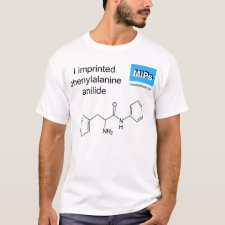
Authors: Titirici MM, Sellergren B
Article Title: Thin molecularly imprinted polymer films via reversible addition-fragmentation chain transfer polymerization.
Publication date: 2006
Journal: Chemistry of Materials
Volume: 18
Issue: (7)
Page numbers: 1773-1779.
DOI: 10.1021/cm052153x
Abstract: Mesoporous silica beads modified with an azo initiator were used for grafting of cross-linked molecularly imprinted polymers through reversible addition-fragmentation chain transfer (RAFT) mediated polymerization. The RAFT mediation allowed an efficient control of the grafting process and led to suppression of the solution propagation preventing any visible gel formation. Thus, graft copolymerization of methacrylic acid and ethylene glycol dimethacrylate using 2-phenylprop-2-yl-dithiobenzoate as the chain transfer agent and in the presence of L-phenylalanine anilide as the template led to imprinted thin film composite beads. The resulting composites were characterized by Fourier transform infrared spectroscopy, nitrogen sorption analysis, elemental analysis, fluorescence microscopy, and scanning electron microscopy and as stationary phases in chromatography. This indicated the presence of thin homogeneous films (thickness: 1-2 nm) containing imprinted sites for the template (L-phenylalanine anilide). The resulting materials proved to be highly selective chiral stationary phases resulting in baseline separations of the template racemate and of structurally analogous racemates within a few minutes. These results were comparable with results obtained for materials prepared in the absence of RAFT mediation with the notable difference being the absence of detectable solution gelation using RAFT.
Template and target information: L-phenylalanine anilide



Join the Society for Molecular Imprinting

New items RSS feed
Sign-up for e-mail updates:
Choose between receiving an occasional newsletter or more frequent e-mail alerts.
Click here to go to the sign-up page.
Is your name elemental or peptidic? Enter your name and find out by clicking either of the buttons below!
Other products you may like:
 MIPdatabase
MIPdatabase









